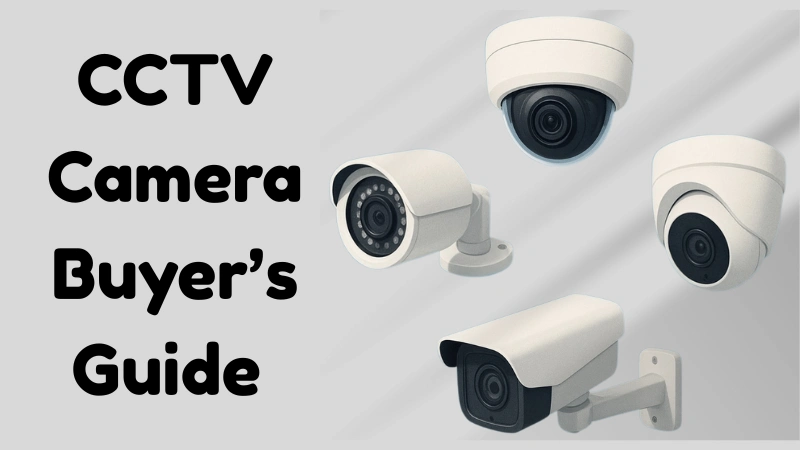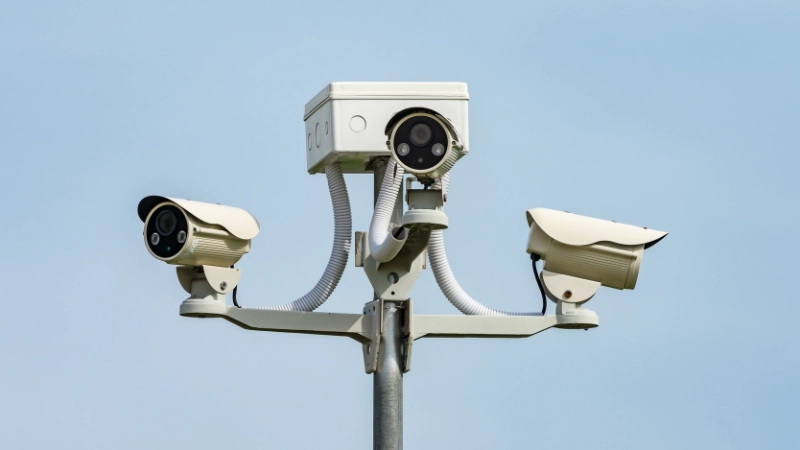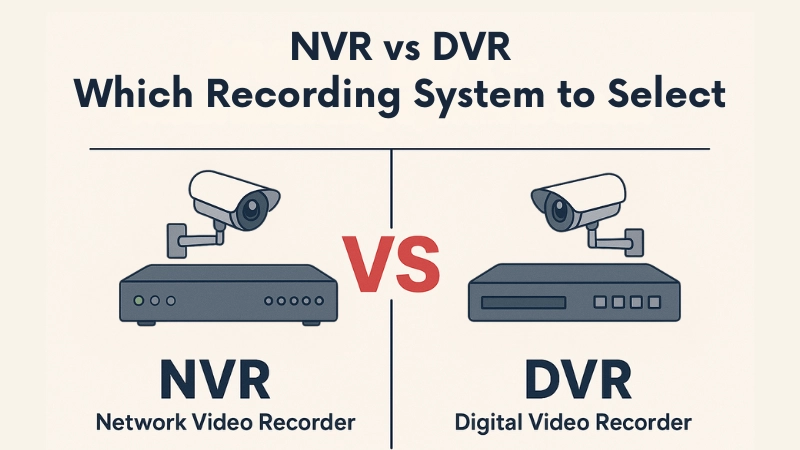Security
CCTV System Buyer’s Guide 2025: Trends, Types, and Top Brands for Every Need
By this buying guide, you’ll get you to know about the options available in market. It will help you understand the latest trends, different types of CCTV cameras, and the top brands. By the end, you will be able to make informed decisions and investments with regards to your specific needs.
Why CCTV is Necessary in Dubai ?
A CCTV camera is part of comprehensive proactive security measures. In this regard, modern video surveillance systems are of utmost importance today for the following reasons.
- Increased Security Risks
The growth of urban populations, increased property values, and business expansion in regions such as Dubai and Abu dhabi are positively correlated to the increase in concern for theft, vandalism, and trespassing. Effective CCTV systems not only record incidents, but they also deter modern day criminals. - Investigation and Evidence Collection
Well-placed security cameras capture critical evidence such as faces, license plates, and timestamps, enabling the rapid resolution of disputes. Filmed evidence also aids businesses in monitoring their customer care associates for better level of service. - Smart Technology Integration
CCTV cameras can be connected with modern alarming systems, motion detectors, and even locks. In 2025, Smart security systems will be able to offer mobile monitoring, instant alerts for suspicious activity, and management of multiple sites from anywhere in the world. - Peace of Mind for Families and Businesses
Whether you’re monitoring stock levels in your shop or protecting your children at home, having a dependable surveillance system operating round-the-clock provides unparalleled reassurance.
CCTV Technology Trends in 2025
The CCTV camera market is on the brink of a major technological shift. The current generation of video surveillance has smart features, offers sharper video quality, and has better connectivity. The current trends influencing the industry are as follows:
- AI-Powered Motion Detection & Facial Recognition
Artificial intelligence systems embedded in today’s IP cameras are capable of identifying whether the person in frame is a human, an animal, or environmental movements like swaying trees. Moreover, TKAI systems makes identification and automated security triggers easier through facial recognition.
- 4K Ultra-HD and Low-Light Performance
The industry standard now features security cameras with 4K ultra high definition. The new standards use intelligent 4K cameras that boast considerable detail for both indoor and outdoor surveillance. Additionally, these security cameras have advanced low light and infrared (IR) features that ensure crisp imagery, even in near darkness, ideal for large scale properties and home security.
- Storage in Clouds as Well as Remote Access
Forget worrying about misplaced hard drives. As of 2025 CCTV installations often incorporate cloud storage which provides 24/7 access to footage. Whether on the other side of the world or away from the office, remote log in is always an option to check live or previously recorded footage.
- Modern Wireless and Battery Operated Cameras
As the newer wireless CCTV models are much easier to install and maintain, they do not require extensive cabling. These models are great for makeshift setups in hard to access areas as they retain battery power for months without needing a recharge.
- CCTV Cameras Integration with IoT and Smart Assistants
CCTV goes to the next level by becoming an integral part of the smart ecosystem as users can request Alexa to display feeds, and smart lights can also incorporate illumination when motion is detected.
These innovations and developments by 2025 mean it is no longer a question of whether you’d require a CCTV camera, it is a question of how you require it to perform, the features you want it to possess, and how scalable you would want it to be.
Understanding Different Types of CCTV Cameras
Understanding the different types of CCTV cameras available helps selecting the best for ones home or business. Their are different types of CCTV designs that are tailored to unique advantages and depend on the location, budget, and security needs.
Analog Cameras
Basic video surveillance using traditional analog cameras remains affordable and dependable. These cameras send footage to a DVR (Digital Video Recorder) and are appropriate for small businesses or locations that do not require ultra-high resolution footage.
IP Cameras
IP (Internet Protocol) cameras offer better image quality and more advanced features (e.g. AI analytics) compared to traditional analog cameras, as they transmit video over a network digitally. In addition, IP systems often save footage onto NVRs (Network Video Recorders) or in the cloud, supporting more advanced features and scalability.
Bullet Cameras
Bullet CCTV cameras are easily identifiable by their cylindrical shape, which is beneficial for long-range viewing, especially in outdoor locations. Moreover, their shape and sturdiness makes them popular outdoor security cameras as they can withstand harsh weather.
Dome Cameras
Dome surveillance cameras are compact and discrete, but offer wide-angle coverage making them suitable for a variety of interiors. Their dome shape construction makes it harder to discern the directions of the lens, which acts as a deterrent for potential wrongdoers.
PTZ Cameras
Through remote controls, PTZ or Pan-Tilt-Zoom cameras can adjust their view and zoom levels. These wireless surveillance cameras are suitable for large spaces like warehouses, stadiums, or other public areas, as they can track and follow moving objects in real time.
Wireless Cameras
Wireless CCTV cameras can be installed and adjusted easily. They are particularly useful for renters and in locations where cabling is inconvenient. Most new models have mobile access and come with battery backups.
Thermal/Infrared Cameras
Thermal and infrared cameras are important for general security and industrial endurance in harsh conditions and low light as they can record heat signatures.
Analog vs IP Cameras: Which Should You Choose?
Once you’ve selected your CCTV camera types, the next step is deciding how to store and manage footage—using either an NVR vs DVR.
| Feature | Analog Camera | IP Camera (Network Camera) |
| Image Quality | Lower resolution (up to HD) | High resolution (Full HD, 4K, and beyond) |
| Transmission | Coaxial cable to DVR | Ethernet or Wi-Fi to NVR or cloud |
| Features | Basic video recording | Advanced features like AI analytics, motion detection, zoom |
| Cost | More affordable upfront | Higher initial cost but more scalable |
| Remote Access | Limited, requires additional equipment | Built-in remote viewing via apps/web browsers |
| Scalability | Harder to expand | Easy to expand and integrate with other devices |
Recommendation:
If your small stores or homes need a low-cost analog CCTV installation, this will be a useful solution.
IP would be the better choice for longer lasting and expandable systems to install.
NVR vs DVR: Which Recording System to Select
After selecting the type of CCTV cameras for your security system, the next step is to determine the footage storage and management system—either NVR (Network Video Recorder) or DVR (Digital Video Recorder) systems.
| System | Pros | Cons |
| DVR (Digital Video Recorder) | – Lower initial cost – Simple setup for analog cameras – Reliable for basic surveillance needs |
– Limited remote access – Lower image quality compared to NVR – Less scalable for future upgrades |
| NVR (Network Video Recorder) | – Superior image quality (up to 4K) – Easy remote access via apps/web – Supports advanced features like AI analytics & cloud storage |
– Higher initial cost – Requires stable network infrastructure – More complex setup for beginners |
Which to choose?
- Select DVR if your system is limited to analog cameras and you need a low-cost solution.
- Select NVR if your system requires remote access and is expected to offer advanced features like high-
- definition video, primary in a smart security environment.
Compare NVR and DVR systems to find the best fit for your surveillance setup
Top CCTV Camera Brands in 2025
Hikvision
Hikvision was established in 2001 by Chen Zongnian and is headquartered in Hangzhou, China. It is now one of the largest global suppliers of video surveillance equipment. Hikvision’s CCTV cameras include analog, IP, PTZ, thermal, and AI-powered cameras. Their cloud-based and high tech surveillance equipment is widely used and trusted by private individuals, corporations, and government institutions for advanced analytics and high-resolution imaging. Their products integrate well with NVR systems and other cloud-based solutions.
Discover top Hikvision CCTV cameras for home and office security
CP Plus
In 2007, Aditya Khemka established CP Plus, and in no time, it emerged as one of the top CCTV camera manufacturers in Asia and the Middle East. They offer analog, IP, wireless, and PTZ cameras for residential and enterprise-scale surveillance. They are known for providing affordable products that do not compromise quality. CP Plus also manufactures and supplies video recorders, security accessories, and integrated security solutions for residential, office, retail, and industrial spaces.
Learn why CP Plus cameras are a reliable choice for your security needs
Dahua Technology
Dahua Technology is a global surveillance service and video surveillance technology provider, founded in 2001 in Hangzhou, China, by Fu Liquan. They manufacture different types of CCTV cameras such as analog HD, IP, PTZ, thermal, and panoramic cameras. Dahua is noted for innovation in AI video analytics, smart video surveillance, low-light technology, and smart video surveillance systems. They serve such markets as residential, commercial, transportation, and city surveillance systems across the globe.
Ezviz
Ezviz is a smart home camera company established in 2013 as a subsidiary of Hikvision focused on consumers. It operates out of Hangzhou, China, and offers wire-free indoor and outdoor cameras, video doorbells, and even battery-operated cameras. Ezviz’s focuses put them at the forefront of mobile app and cloud software, and user-friendly cameras, making them perfect devices for security at homes, particularly for those at a low price range with high-quality and advanced features such as two-way audio and motion-detection capabilities.
Samsung
Now functioning under the Hanwha Vision name, formerly known as Samsung Techwin, Samsung’s security division was established in 1977 in South Korea. Samsung manufactures various types of high-quality CCTV cameras, including analog, IP, PTZ, and panoramic cameras. Their products are well accepted in the surveillance markets of the corporate, industrial, and public sectors. Samsung cameras are known for their rugged reliability and construction as well as image processing capabilities like WDR and low-light imaging.
Axis Communications
Axis Communications was established in 1984 in Lund, Sweden, by Mikael Karlsson, Martin Gren, and Keith Bloodworth. They are considered the pioneers of network video. The company launched the first network camera in 1996. Axis specializes in the manufacture of IP CCTV cameras, which include fixed dome, bullet, PTZ, and panoramic cameras. Their products are known for high resolution, cybersecurity, and the ability to integrate with video management systems for small and large scale surveillance projects.
Honeywell
Founded in 1906 by Mark Honeywell, an American multinational, Honeywell operates in diverse industries, including building technologies and security. Honeywell Security services range from analog HD to IP and wireless CCTV cameras. These are often part of comprehensive building management systems. Their products are durable and easy to integrate and have been designed to meet the security needs of commercial, industrial, and government clients. Compliance and reliability have been widely emphasized in the products.
CCTV for Different Needs and Requirements
Every property has different security needs. From simple home security cameras to complex commercial-grade surveillance systems, every setup is designed with specific needs in mind.
Home Security
Specialized for residences, compact wireless and dome CCTV cameras are preferred. These systems integrate with smart home technology, provide mobile alerts, and can be installed by the users themselves without professional assistance.
Small Businesses
CCTV coverage for small businesses, including small offices, shops, and cafes, is best served with a combination of bullet CCTV cameras for exterior and dome cameras for interior muling. NVR systems are particularly advantageous in this space due to their scalability.
Large commercial and industrial areas
Warehouses, factories, and even large retail shops require PTZ camera networks, thermal imaging equipment, as well as IP camera systems, which all need to be linked to a centralized control room.
Find expert tips on selecting the best CCTV cameras for home and office
Installation and Maintenance Guidelines
The effectiveness of a CCTV camera is hugely based on the positioning and the maintenance it receives. Regardless of how advanced a CCTV camera is, neglecting maintenance, as well as poor positioning, can completely nullify its efficiency.
- Placement: Set up cameras in critical areas, including all blind spots, high-traffic zones, and entry and exit points. Outdoor models should be positioned at a secure height to prevent damage from weather.
- Network Security: For IP cameras, secure your network access points with robust passwords and regularly update firmware to mitigate hacking risks.
- Regular Checks: Ensure all systems are operational, including the recording systems, dirt detection on the lenses, and night vision features.
- Professional Installation: Although DIY systems are possible, professional CCTV installation assures reliability in performance and coverage.
Understand the technology behind CCTV cameras and how they function
What to consider before buying a CCTV system?
Prior to your purchase of a CCTV camera, consider the following:
- What’s your budget? Your budget should consider the cameras and recording equipment, installation services, as well as upkeep.
- What is the coverage area? Larger areas may require the use of more cameras or more advanced models such as PTZ cameras.
- Will you require remote access? If yes, select IP cameras with cloud integration or NVR systems.
- What is the desired level of detail? For recognition of faces or license plates, 4K is the desired resolution.
- Is being able to add more cameras in the future important? Select systems that permit additional cameras to be added later.
Conclusion
The CCTV camera market in 2025 is evolving with advanced features such as 4K video, cloud storage, AI technology, and real-time facial recognition. These innovations make security systems smarter, more reliable, and future-ready. For homeowners and businesses in Dubai and across the UAE, investing in a trusted surveillance system ensures safety and peace of mind. Leading brands like CP Plus and Hikvision offer long-lasting solutions tailored to different needs. To enjoy the best CCTV camera in Dubai at competitive prices, backed by expert service, visit Cost to Cost Trading—your reliable partner for complete security solutions.





























































